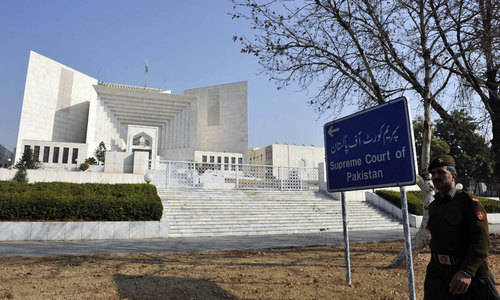ISLAMABAD: The Supreme Court has held that a police officer should have sufficient grounds prior to exercise of his discretion to arrest a person on the basis of some allegations.
“Having the power to arrest is one thing but the justification for the exercise of that power is quite another,” observed Justice Syed Mansoor Ali in a five-page judgement given on an appeal by Shahzada Qaiser Arfat against a March 3, 2020, Lahore High Court order.
Ordinarily no person should be arrested straightaway only because he has been nominated as an accused in an FIR until the investigating officer feels satisfied that sufficient justification exists for his arrest, the judgement explained.
“No doubt, a police officer, under Section 54 CrPC, has the power to arrest a person who has been involved in any cognisable offence or against whom a complaint has been made or credible information has been received or a reasonable suspicion exists of his having been so concerned,” the judgement said, adding that the police officer cannot arrest a person only because he has the power to do so since he must also show sufficient grounds for making the arrest.
Verdict says protection against arbitrary detention is part of the right to liberty, fair trial
Article 4(1)(j) of the Police Order, 2002 states this legal position when it prescribes that it is the duty of every police officer to “apprehend all persons whom he is legally authorised to apprehend and for whose apprehension sufficient grounds exist,” the judgement said.
The case at hand concerns a Dec 7, 2019 incident when three persons were shot dead on G.T. Road in Ferozewala, Sheikhupura district. Five brothers and three unidentified persons were nominated in the first information report (FIR) as the assailants, while the sixth brother. Shahzada Qaiser Arfat (petitioner), and their father were nominated as abettors, alleged to have instigated and conspired the murder.
The sessions and high courts dismissed the pre-arrest bail of the petitioners as a result of which the March 3, 2020 LHC order was impugned before the apex court through the present petition.
The high court had declined the pre-arrest bail on the grounds that such relief was extraordinary and could only be extended to an innocent person who was implicated in the case on the basis of mala fide, but the petitioner in this case had failed to point to any mala fide.
Justice Mansoor Ali Shah, however, observed that the high court had failed to appreciate that the mala fide being a state of mind cannot always be proved through direct evidence and it was often to be inferred from the facts and circumstances of the case.
Justice Shah observed that Police Rules, 1934 explained that the authority given under Section 54 of the CrPC to the police to arrest without a warrant was permissive and not obligatory.
The investigating officers should not mechanically arrest a person accused of having committed a cognisable offence, rather they must exercise their discretion judiciously by applying their mind to the particular facts and circumstances of the case and consciously considering the question: what purpose will be served and what objective will be achieved by the arrest of the accused person?
Likewise, the power of high courts and sessions courts to grant the pre-arrest bail — first and foremost — must be examined in the constitutional context of liberty, dignity, due process and fair trial.
Pre-arrest bail is in nature a check on the police power to arrest a person. The non-availability of incriminating material against the accused or non-existence of a sufficient ground including a valid purpose for making arrest of the accused person in a case by the investigating officer, would as a corollary be a ground for admitting the accused to pre-arrest bail, and vice versa.
Protection against arbitrary arrest and detention is part of the right to liberty and fair trial, the judgement emphasised, highlighting that the apex court had in many cases granted pre-arrest bail to accused persons after finding that there were no reasonable grounds for believing their involvement in the commission of the alleged offences and had not required independent proof of mala fide on the part of the police or the complainant before granting such relief.
Non-availability of the incriminating material against the accused, his implication by the complainant and the insistence of the police to arrest him are the circumstances which by themselves indicate the mala fide on the part of the complainant and the police, and the accused need not lead any other evidence to prove mala fide on their part.
Consequently, the court allowed pre-arrest bail to the petitioner subject to his furnishing bail bond in the sum of Rs100,000, with one surety in the like amount, to the satisfaction of the trail court/illaqa magistrate.
Published in Dawn, April 9th, 2021














































